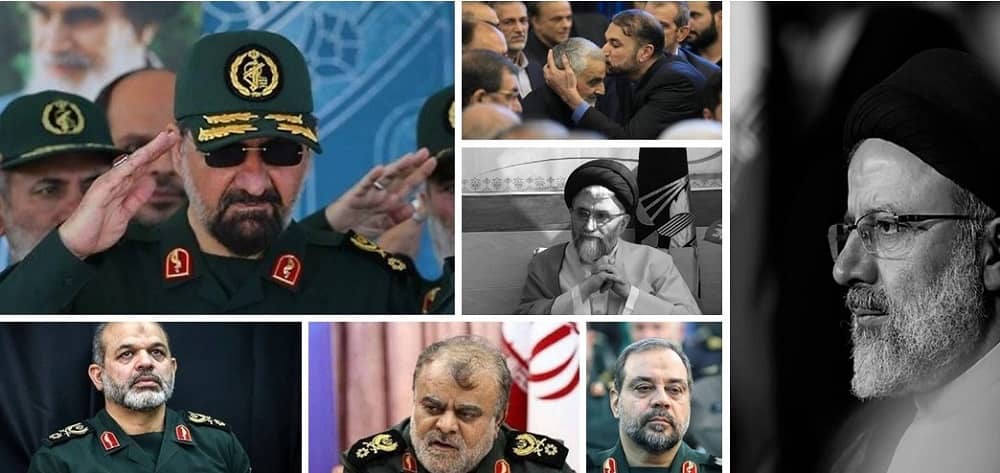
According to the analyses of the National Council of Resistance of Iran (NCRI), and the People’s Mujahedin of Iran (PMOI / MEK Iran), For years, Ali Khamenei, Iran’s Supreme Leader, who has the ultimate say on all key decisions, has recognized that even the tiniest disagreement within his regime directly threatens the government’s survival.
Sham parliamentary and presidential elections
During the 2020 parliamentary election and the sham presidential election in 2021, Khamenei utilized the Guardian Council to “purify” the parliament of “non-revolutionary” individuals. He also managed to secure victory for Ebrahim Raisi, the ‘Henchman of 1988,’ at the polls. The proposed ministers were overwhelmingly accepted by parliament, and parliament speaker Mohammad Bagher Ghalibaf, who has a deadly history of his own, interfered wherever necessary to ensure Khamenei had the cabinet he wanted.
The Chief of the Judiciary, the head of Iran’s Atomic Energy Agency, the head of the national broadcasting agency, and the secretary of the Expediency Council have all been changed. As a result, some individuals who had previously been linked to Tehran’s power center have been marginalized, disqualified, or silenced.
More nuclear extortion
More nuclear extortion and a harder stance toward the JCPOA talks are likely in the near future, given the regime’s evident assumption that it can force the US to back down. Tehran anticipates the Current administration opposing all of the previous government’s policies, especially the strategy of maximum pressure, and avoiding all military action, even in limited forms.
The regime also envisions that Russia and China will oppose any action against it and that Washington will avoid taking any substantial foreign policy moves that could result in political backlash.
With minimal fear of new sanctions
With minimal fear of new sanctions, Tehran is unlikely to go any closer to compliance with the Financial Action Task Force’s international laws under the current administration. This has been a contentious subject for years, and Raisi’s cabinet includes some of the most vocal opponents of FATF compliance, including Mohsen Rezaei, Mohammad Jamshidi, and Ahmad Vahidi.
The potential of lawful global trade was an argument in favor of FATF compliance, but under the current administration, the Iranian regime is likely to lean even more heavily on a strategy of bypassing sanctions. This was undoubtedly the cause for IRGC Brigadier General Rostam Ghasemi’s cabinet nomination, as he has extensive experience in this subject. During Mahmoud Ahmadinejad’s presidency, he organized the circumvention of sanctions and sponsored the regime’s proxy groups across the Middle East as Oil Minister and later deputy economic director of the Quds Force.
Recurrence and expansion of protests
The leadership expects a recurrence and expansion of events comparable to the large protests of January 2018 and November 2019, which shook the regime’s foundations, due to serious domestic issues with economic, social, and political bases.
As a result, Khamenei is supporting a confrontational foreign strategy as well as a confrontational home policy. Ahmad Vahidi’s appointment as Minister of Interior is an unofficial proclamation of a curfew against the protestors, and Khamenei wants to avoid any surprises by appointing Ismail Khatib as Minister of Intelligence, who has spent his entire career destroying the regime’s defectors and whistleblowers.
Economic foundations linked to Khamenei’s office
Economic foundations linked to Khamenei’s office are attempting to seize state economic facilities for further plundering in order to fund ambitious projects in other countries and the proliferation of weapons of mass destruction.
Mohammad Mokhber has turned the Execution of Imam Khomeini’s Order (EIKO) into one of the most important economic institutions in the looting of the country’s assets, and as Vice President, he aims to build an engineering economy in which some ministries will serve as his deputies. In this context, a number of ministers who are representatives of various Khamenei-affiliated foundations will work alongside Mokhber.
The regime lacks both the capacity and the will to build the country’s economic infrastructure. As a result, deception and intimidation are their sole responses to the ensuing protests.
Follow Maryam Rajavi’s on her site Twitter & Facebook and follow NCRI (Twitter & Facebook)
and follow NCRI (Twitter & Facebook)
MEK Iran (on Twitter and Facebook)
and People’s Mojahedin Organization of Iran – MEK IRAN – YouTube







